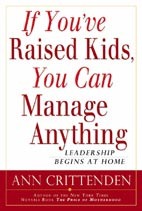
5 Transferable Skills: From Raising Kids to The Job Interview by Mark Anthony Dyson
If You’ve Raised Kids, You Can Manage Anything by Ann Crittenden was written some years ago to show that parenting skills translate to job skills.
In her book, Crittenden expounds in detail on transferable skills such as:
–call for multitasking and the ability to function amidst constant distractions
- –enhance interpersonal skills, from effective negotiation to dealing with difficult people
- –develop skills in motivating and encouraging others to excel
- –teach a keen sense of fair play and integrity, and much more
Each person should self-evaluate his or her own parenting to glean the job lessons from teaching, discipline, and feeding their child. I wholeheartedly subscribe to this not only in theory, but also as a participant and a witness.
Each job seeker who is raising his or her children, should apply this thinking as part of an interviewing strategy and to show transferable skills:
Managing and handling difficult situations
Parents that take the high road here benefit the most because employers do not need to glean that you speak to subordinates or anyone like a child. A demonstration of a diplomatic approach always works without screaming, or yelling comes across better.
Multi-tasking and coordinating
Cooking, cleaning, and helping with arithmetic is no joke. Display your tenacity by sharing how you toggle between home applications (as they were software applications). Show employers how planning is a skill in coordinating your children’s events, activities, and academics.
Networking
Concentrate on how these relationships produced invaluable projects and processes in the Parent-Teacher world. To show you can establish partnerships with others translates in building business partnerships.
Adept to various kinds of learning
Since technology is constantly changing personal communication, and the way you conduct business, and demonstrate the way you monitor your child’s use of online tools on the Internet.
Microsoft Office and Budget
Have you used Excel and Access for budgeting? How about writing school letters and business correspondence. Have you balanced your bank and household accounts using Excel? These are hard skills that have project management elements.
Don’t expect any of these to land you an office of your own, but you can position these as relevant skills in most cases.
About Mark Anthony Dyson
I am the "The Voice of Job Seekers!" I offer compassionate career and job search advice as I hack and re-imagine the job search process. You need to be "the prescription to an employer's job description." You must be solution-oriented and work in positions in companies where you are the remedy. Your job search must be a lifestyle, and your career must be in front of you constantly. You can no longer shed your aspirations at the change seasons. There are strengths you have that need constant use and development. Be sure you sign up to download my E-Book, "421 Modern Job Search Tips 2021!" You can find my career advice and work in media outlets such as Forbes, Inc., Fast Company, Harvard Business Review, Glassdoor, and many other outlets.


